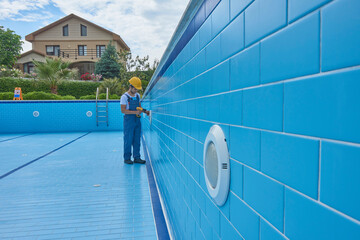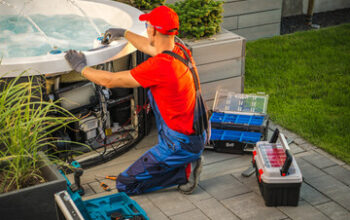If you have a pool, you are likely to need pool equipment repair professional from time to time. Sometimes a simple repair will fix the problem, but other times, you need to have the equipment replaced. Regular checks of your motor, filtration system and other equipment are critical to keeping your pool in good condition. Listed below are some common repairs and maintenance procedures. We’ll look at a few of them.

Getting a professional to maintain your swimming pool is a good idea. These professionals have specialized training and knowledge to fix most problems, so they’ll know exactly what is wrong with your collection. They will make your pool look more sociable, and they’ll also prevent future issues from occurring. And, by hiring a professional, you’ll have a cleaner, healthier pool that will last longer.
The best way to ensure your water quality is to get your equipment repaired as soon as possible. Repairing pool equipment can be expensive. If you don’t know how to fix it, you can spend more money than you should. Whenever your pool equipment breaks down, call a professional to get it fixed for you. If you’re unsure how to improve it yourself, you can also call a professional repair company.
Pool Maintenance: Swimming pool maintenance requires constant upkeep to keep it in good condition. This is important for the health of your pool, but it will also prevent algae from growing and costly repairs. Professional maintenance also protects your wallet and your home. DIY repairs are a risky proposition because they can cause further damage and frustration and even be costly. And don’t forget to include your professional pool maintenance in your budget!
In some cases, pool pumps can malfunction for a variety of reasons. Sometimes, a malfunctioning pump may have blocked a filter or an air leak in its suction line. In other cases, it could be a problem with the motor itself. If you don’t know how to repair a pump, make an appointment with a professional. There are various ways to prevent such problems, and a professional will help you decide which is best.
Replastering: If the surface of your pool is peeling or faded, you may want to consider having it plastered. This will restore the pool’s character, but it will also solve the problem of sore feet and embarrassment. You may also want to consider plastering your pool if it is stained, rough, or cracked. If you can’t take it out and re-plaster it, you’ll be able to get a replacement for it.
In some instances, a pool heater isn’t working correctly. A pool technician should check and repair it if it’s not generating heat. This could be due to a buildup of calcium scales. You’ll need a pool technician to clean out the tubes, and they may have to take them apart for cleaning. The technician should then clean them with an acid solution or a wire brush. This should be done once or twice a year to keep your pool tip-top shape.
Cleaning the filter is another essential maintenance procedure. A swimming technician should inspect the pressure gauge and the flow meter inside the filter. As the filter becomes dirty, the difference between the two gauges increases. When the flow difference is 10 to 15 pounds PSI, it’s time to clean your filter. Your swimming pool technician will recommend cleaning the filter regularly before the water starts to affect the water quality. The technician should also clean the filter before your water becomes deteriorates. This will prevent the need for costly repairs down the road.
Filter cartridges are one of the most common problems with pool filters. They are made of spun polyester bound with a heavy plastic core. Water flows from the outside of the cartridge to the center core, where the pleats grab the dirt. Because the surface area is vast, a cartridge filter requires cleaning twice a year. A filter cartridge typically requires one to two hours of work and will require a service every two to three months.


